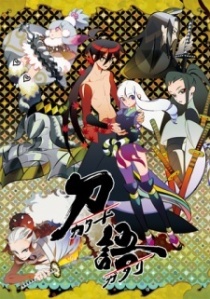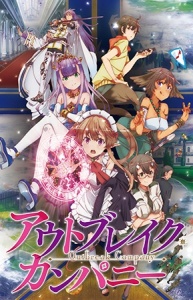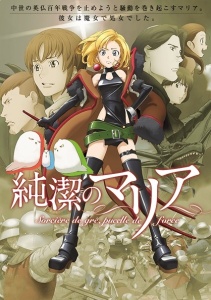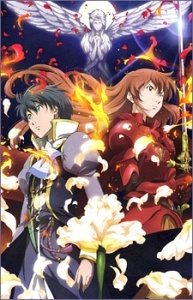- Trailer: NISAmerica trailer
- What it’s about: Two hundred years ago, a swordsmith created a legacy that would shape the future of Japan. The thousand blades he forged decided the victor of the civil war, but those weapons were just practice. His true masterpieces – the 12 Deviant Swords – passed into legend. Now, a wily courtier named Togame has sought the help of a legendary martial artist in tracking them down.
- Why you should watch it: It’s a beautiful show. From top to bottom. The painterly and stylised art style, the choreography and animation, the incredibly varied character designs, the eclectic yet fitting soundtrack, the plot, the characters, the themes and the way that the writers and director manage to pull them all together into an even greater whole. The relationship between the two protagonists has one of the most fun dynamics I’ve seen in anime: simultaneously sweet, funny, and continuously changing as they learn more about each other and themselves. I particularly liked the casual intimacy, in a medium that often struggles to have characters physically close without playing it for laughs. Each episode works almost as a standalone, but when strung together form a truly beautiful story. The show gives its themes space for elaboration without becoming navel-gazing, and keeps things moving with a blend of comedy, action, and conversation.
- Caveats: If you’ve tried any of the writer’s other works – particularly the Monogatari series – you’re likely familiar with the sheer weight of dialogue he heaps onto every scene, and Katanagatari is no exception. Characters will talk while they walk, eat, relax, and fight. It’s all well-written stuff, but I know that it bothers some people so it’s worth mentioning up-front.
- Themes: The burden of legacy. How you need to abandon the past, abandon the expectations placed upon you and the grand goals you set for yourself, and simply live. After all, time brings an end to all things, and the moments that pass will never be recaptured. Living for others and not yourself is the act of a tool – a sword – not a true person. But despite being a show about mortality and futility, it manages to convey a bright message all the same.
- Similar works: Samurai Champloo, Hitsugi no Chaika and, oddly enough, Spice and Wolf.
fantasy
Outbreak Company
- Trailer: Opening animation
- What it’s about: Filling in an online “Otaku Quiz” is an odd way for your life to be turned upside-down, but that’s exactly what’s happened to Shinichi. It turns out that the Japanese government has made contact with another world, one filled with magical races and fantastical creatures. The ruler of this strange land has expressed an interest in learning about Japanese culture, and it’s down to Shinichi to act as a “cultural ambassador”, exporting anime, manga, and otaku culture to a new frontier.
- Why you should watch it: It’s a fairly light-hearted comedy mixed with a fantasy adventure. Outbreak Company is otaku culture poking fun at itself, with constant references to existing anime, manga, or media tropes. On top of the referential jokes and self-parody are a lot of slapstick and some relationship humour between Shinichi and the expanding cast of characters that he meets as part of his new job. And while there’s plenty to laugh at, the show actually does do a good job of conveying some deeper messages about cultural imperialism, discrimination, and commercialism. It also has a half-elf maid, animal-girls, and a tsundere princess. What’s not to love?
- Caveats: The show doesn’t make many mistakes, as such, but it never really tries to be *great*. While I had a lot of fun while watching it, I don’t really expect to remember all that much about the characters or plot a year from now. In short, it’s a fun but ultimately disposable show.
- Themes: It has a little to say about a lot of things. Commercialism, materialism, objectification, cultural imperialism, the negatives and positives of “otaku culture”. But at its core, it’s about spreading the ideas that you love and support to another person, while desperately hoping that they’ll like it too. Overall, the thematic development plays second or third fiddle to the comedy and fan-service elements of the show, which is just fine in a fun, light-hearted show like this.
- Similar works: No Game No Life. For a more serious take on “Modern Japan meets fantasy world”, Gate.
DanMachi
Dungeon ni Deai wo Motomeru no wa Machigatteiru Darou ka?
- Trailer: Preview trailer
- What it’s about: Gods have come to the world, and have decided to have some fun by running it as an RPG. Through performing heroic tasks and killing monsters in the gigantic labyrinth known only as the Dungeon, their followers gain incredible power, wealth, and status. To date, the goddess Hestia has only managed to attract one person into her Familia – the idealistic young adventurer Bell Cranel. But after a chance dungeon encounter provides Bell with the more concrete goal of becoming as strong as possible as quickly as possible, things begin to change for both of them.
- Why you should watch it: It’s a fun, fast-paced fantasy action show. DanMachi makes the conscious decision to just embrace the tropes of stories like this and run with them, and the result is a polished, charming coming of age story. It manages to balance comedy, action and plot pretty well, and throws in light romantic notes to keep things interesting. The creators have effectively managed to boil down the source material to exactly what’s needed to keep the show moving forward – there’s no wasted space and at least one big “spectacle” scene in every episode. Hestia herself has proven a very popular character, but it’s Bell who carries the show as the naïve but well-meaning (and increasingly bad-ass) protagonist. In short, it’s great light entertainment aimed at a primarily young male audience.
- Caveats: Well, it’s inevitably going to draw comparisons to Sword Art Online, much of them deserved. I do wish that a show about adventure had been a bit more…adventurous with the story it wanted to tell. Still, there’s nothing wrong with sticking to the classic tropes if you can put a new shine on them, and DanMachi pulls that off quite nicely. The harem elements start to grind as Bell picks up an increasingly preposterous set of admirers without realising that a single one of them is interested in him romantically. Critics nit-pick the loss of the detailed stats and explanations; it’s a valid criticism, but I think it managed to strike a nice balance between exposition and leaving some stuff for the source material itself to expand on.
- Themes: Nothing all that ground-breaking – it’s a pretty typical “power of heart” shonen action show, where not giving up is the key to both victory and the hearts of beautiful ladies alike.
- Similar works: Sword Art Online is easily the closest comparison. They even share the same voice actor in the lead role.
Junketsu no Maria
- Trailer: Fan-made AMV
- What it’s about: The Hundred Years War is in full swing, and France and England are at each other’s throats. When peasants from a nearby village are levied for the latest battle, the witch Maria steps in, using her magic to bring the fighting to a standstill. But as her use of magic becomes too obvious to ignore, the archangel Michael intervenes, putting a watcher in place to ensure that her sorcery remains secret, under pain of death.
- Why you should watch it: Sex jokes and large-scale medieval battles. Junketsu no Maria offers a surprisingly accurate portrayal of the Middle Ages, with some obvious fantastical elements thrown in for good measure. There are no simple villains or heroes to the story – Maria’s interventions in the war are alternately praised by the survivors and cursed for prolonging the conflict and causing greater casualties. I particularly liked the character of the priest Bernard, who is forced to question his faith as the “heathen” witch is saving lives while the Lord’s angels are noticeably silent. The animation is bright, clean, and colourful, and the character designs for the protagonists are great. The plot moves along at a nice clip, and the series manages to wrap up the story completely in 12 episodes (which is a nice bonus in anime).
- Caveats: While “Maria the Virgin Witch” sounds a lot like the title of a hentai, and the show does have a certain level of fanservice, there’s nothing distractingly raunchy after the first episode or two. The BD version is likely to provide better battle scenes and tidy up some of the niggling animation issues, so get those for the full experience.
- Themes: The morality of interventionism – when should you step in, and when should you just stand aside and let the parties involved settle things for themselves. There’s a humanist/theist argument going on in the background, and a few nods to the conflict between living in the past and for the future. In all, it’s a show about striking a balance between competing priorities.
- Similar works: Where Junketsu no Maria is about someone trying to stop war at the ground level, Maoyuu Maou Yuusha follows someone trying to stop war through more abstract means, mostly economic and political.
Garo: Honoo no Kokuin
- Trailer: PV Trailer
- What it’s about: The border between the world of demons and the human world is paper-thin. Strong negative emotions invite Horrors across the gap – monsters who possess those in despair to wreak havoc. Until recently, the threat of these Horrors was kept in check by the order of Makai Knights. All of that changed when the Makai Knights were accused of witchcraft, and the order has been hunted to all but extinction. Leon Lewis wants to live up to the ideals of the Makai, while wrestling with his own desire for revenge against those who burned his mother at the stake.
- Why you should watch it: An adaptation of a long-running and hugely successful live-action series, Garo has a rich world and mythology to draw upon. The show spins a grand tale of heroism and vengeance. The real heart of the story, though, lies with the characters. They’re all well-written, and the voice actors (especially that of the scheming advisor Mendoza) put in some stellar performances. Leon’s character arc in particular is excellently realised – while he starts out looking to be your cookie-cutter brooding teenage angst-magnet, his struggles and failures throughout the show serve to temper and strengthen him into a genuine hero by the end.
- Caveats: The show struggles a bit in some of the early episodes with balancing the need for impressive fight scenes against its animation budget. Garo is a show that gets steadily better as it settles into its pace, but there’s no real “wow” moment to hold out for. If the first few episodes don’t appeal to you, feel free to drop it.
- Themes: Garo is at its core a story about not giving into negativity, of suffering and coming out stronger on the other side. The destructive outcome of doing that is shown physically in the creation of Horrors, and more personally in Leon’s ongoing struggle with his own rage and bloodthirst. Every character in the show suffers or has suffered losses, and they all deal with it differently.
- Similar works: The live-action show is an obvious place to move onto if you enjoyed this. It has a completely different setting and set of characters, but the lore and the themes are much the same. Shingeki no Bahamut is another anime to look at, if you haven’t already seen it.
A Piece of Phantasmagoria
- Trailer: None that I can find. The episodes are only three minutes each, though, so a trailer seems a bit redundant.
- What it’s about: The world of Phantasmagoria exists only in dreams, populated by a bizarre set of groups and individuals. Each episode provides a small glimpse into a different section of the world, steadily assembling a picture of a strange world of interconnected and bizarre locations. From a town made of bread to a sea of glass, from a factory converting rainbows into paint to the movie projector that overlays the stars into the night sky, the inhabitants of Phantasmagoria interact in unusual and unpredictable ways with the place they call home.
- Why you should watch it: It’s a sedate, dreamlike series of shorts. Bedtime stories, really. The calm narration, the surreal but peaceful people and events, even the simplistic visuals and sound design all seem to come together to present something truly unique. This is a pretty classic take on animation. It’s imaginative, it’s weird, and it’s wonderful. It’s not really a show to binge through, though. Just take an episode or two at a time before bed or when you feel the need to calm down a bit.
- Caveats: The show has very, very crude animation even for its time, and it looks even worse in comparison to the slick presentation of the average show today. It’s also quite hard to find a legal subtitled copy of the series, though there are always certain places on the web that will have it available.
- Similar works: Bartender has a very similar feel to this show. As does Mushishi, to a lesser extent. Outside of anime, take a look at Salvador Dali’s Destino.
Sunday Without God
- Trailer: PV Trailer
- What it’s about: God has abandoned humanity. That’s the assumption, at least, after it becomes apparent that no new children are being born, and nobody currently living is able to move on after they die. Instead, they continue to animate their corpses, existing more or less as they did while alive. The only way out is to be buried by one of the mysterious “Gravekeepers”. In a rural out of the way village, a young girl named Ai takes up the shovel to act as Gravekeeper for her community, without really knowing much about what the job entails.
- Why you should watch it: The worldbuilding in Sunday Without God is first-rate. The premise alone was enough to get me to start watching, and the first two arcs flesh out the strange new world shared by the living and the dead with an interesting set of characters. When the soundtrack’s good, it’s *really* good – I particularly like the opening sequence, but the score manages to hit the key emotional moments with aplomb. The arc-based storytelling format means that if you don’t like a particular storyline, you can skip ahead a few episodes and pick it up when the cast move on.
- Caveats: It’s rushed. The first arc alone could have – and probably should have – been given twice the space, and the second is no different. With worldbuilding put first and with so little time to tell each story, character development is largely limited to Ai herself. Each of the arcs leaves you wanting more – which is excellent in one sense but slightly irritating in another.
- Themes: Growing up and assuming responsibility. Death, and moving on.
- Similar works: Shinigami no Ballad, Hitsuki no Chaika.
Shingeki no Bahamut
- Trailer: PV Trailer
- What it’s about: Favaro is a bounty hunter with a rogueish charm, surviving on his wits and combat skills. He’s made more than a few enemies in his time, including the relentless former nobleman Kaisar. By pure accident, a young woman of mysterious origins overhears one of his taller tales – about visiting the mythical land of Helheim – and mistakes it for the truth, taking him on as a guide.
- Why you should watch it: Bahamut was one of the biggest surprises of 2014. By all rights it should have just been another generic card-game adaptation of the kind that we’ve seen dozens of times before. Instead, what we got was a flawlessly animated major action-adventure series reminiscent of Pirates of the Caribbean or The Road to El Dorado. The cinematography and direction are incredible, not just for a card game adaptation but by any standard. The characters are distinct, likeable, and consistent, with clean attractive designs. The story is leavened by a dose of humour (mostly well-executed sight gags), and the world itself is more interesting than I’d expected. It’s just a really fun show to watch.
- Caveats: Shingeki no Bahamut is at its strongest when the episode isn’t actually progressing the central plot all that much. The story itself is, at its core, a pretty generic fantasy adventure; it’s the character interactions that make the show what it is, and where it rightly spends most of its time. There’s a noticeable dip in the quality of the CGI elements in the middle of the run. But even at its worst, it’s still good television.
- Similar works: The aforementioned Pirates of the Caribbean. Within anime, Hitsugi no Chaika, Garo: Honoo no Kokuin, and Samurai Champloo.
Romeo x Juliet
- Trailer: English dubbed version
- What it’s about: Fourteen years ago, there was a coup in Neo Verona. The reigning Capulet family were slaughtered down to the last woman and child by their rivals, the Montagues. Or so it was thought. A single survivor, the duke’s young daughter Juliet, was smuggled out of the castle and kept secret for over a decade while the ground was laid for a rebellion against the Montagues and a restoration of the Capulet dynasty. Juliet herself is unaware of her heritage, and has been fighting as a vigilante against the increasingly corrupt and violent city guard in defence of the people, when she runs into a young noble named Romeo – the son of Duke Montague.
- Why you should watch it: It’s an excellent example of the “action romance” genre, and balances both halves incredibly well. At the same time, the plot spins out at a perfect pace, neither lingering nor rushing through Juliet’s progression and her coming to terms with her destiny. The animation and character designs are clean and well-executed, and the soundtrack (including a Japanese cover of “You Raise Me Up” as the title song) adds an emotional depth to every major scene. It’s also interesting to see an “outside view” of Shakespeare’s work; it’s a different story than the one you might know, more fairy tale than Greej tragedy, but it’s still quite well told. The English dub is well worth picking up if you don’t have a strong preference for subs, as there’s some poetic lines from the original work put in now and then that add some flavour to the script.
- Caveats: There is little effort put into creating nuanced antagonists. Montague himself is a classic moustache-twirling tyrant and the traitors, turncoats, and city guards are unambiguously evil. This simplification carries through into the plot itself, with much of the original tragedy excised and streamlined. As a standalone work the show is excellent; as a reflection of the classic play it’s a little lacking. This is not exactly a fair comparison to make, though.
- Themes: Much like the original, doomed love is where the meat of the story lies. Acceptance of one’s duties and obligations, and heroic sacrifice to see them through, is also a primary focus for Juliet’s “coming of age” as well as several secondary characters.
- Similar works: The Twelve Kingdoms. If you want more adaptations of classic Western literature, try Zetsuen no Tempest or Gankutsuou: The Count of Monte Cristo
Yuuki Yuuna wa Yuusha de Aru
- Trailer:Note that the promotional materials for this show were created to be deliberately misleading, painting it as a simple Slice of Life show. Nonetheless, here’s the official preview trailer
- What it’s about: Yuuki Yuuna is a Hero. That is, she’s a proud member of her middle-school Hero Club, and she spends her days helping others with tasks great and small. As it turns out, however, the club is a front. It’s an excuse to gather together girls with the potential to use Holy Magic in defense of the world against the alien Vertex threat. This looks like a dream come true for the valiant Yuuki, but nobody seems to be able to give a straight answer about the details of the threat they face.
- Why you should watch it: The show is quite explicitly modeled after the hugely successful and influential Mahou Shoujo “deconstruction” Madoka Magica – just look at the character designs and colour schemes and you’ll get a good idea of the roles each of the girls are going to play in the show. That said, the series takes its own path, spending a great deal more time developing its characters and showing them living their lives, and all the while the audience waits for the other shoe to drop. The audience gets a sense that something is off, something is wrong, but without anything specific to put a finger on. This tension is maintained marvelously. The show slowly builds upon itself, reaching a crescendo, allowing for all of the built up emotion and uneasy feeling to spill over. The result is a consistent ride of trepidation that never lets up.Backing this up is some seriously gorgeous artwork for the “battleground” world and an energetic soundtrack that keeps up handily with the action set pieces.
- Caveats: First off, this is unapologetically a Mahou Shoujo series, complete with fan-servicey transformation scenes and butt-kicking middle school girls. What “twists” there are are also spread across the whole series, so you’re going to be spending a great deal of time watching general Slice of Life scenes with the characters interacting in a relatively normal middle school environment.
- Themes: Sacrifice and altruism, friendship and family. Power comes with a price, but that price is worth paying to protect those you care about. As the show explicitly states, anything is possible if you try hard enough with your friends.
- Similar works: Madoka Magica, Selector Infected WIXOSS.









